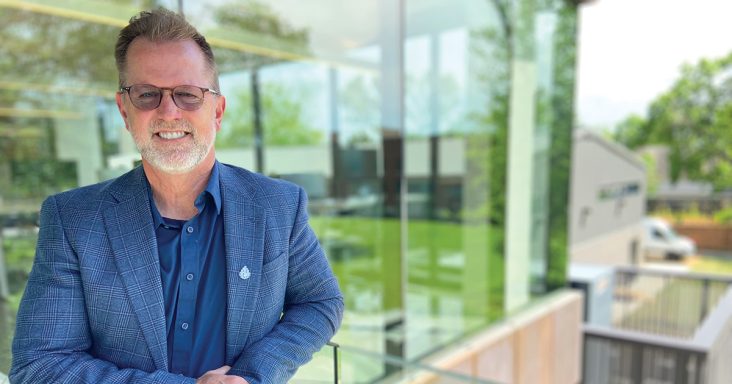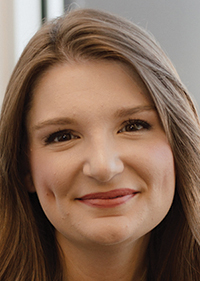Startup Junkie takes reins of AEDC technology contract
by May 27, 2024 8:21 am 884 views

Jeff Amerine, founder and managing director of Startup Junkie, is co-director of a program supporting technology and tech-enabled startups in Arkansas.
The Arkansas Statewide Technology Commercialization Center, an Arkansas Economic Development Commission program, has helped technology startups become viable businesses that have collectively generated nearly $1 billion in revenue.
Recently, Fayetteville-based Startup Junkie Consulting was awarded the contract to oversee the program. Startup Junkie, in collaboration with the state agency, will soon launch a new website and branding for the program.
Jeff Amerine, founder and managing director of Startup Junkie, is a program co-director. Grace Rains, executive director of Conductor, is also co-director. As a Startup Junkie dba, Conductor was created in partnership with the University of Central Arkansas to offer resources and support for small businesses and entrepreneurs in central Arkansas.
Conductor is based at the Arnold Innovation Center, a coworking space in Conway. Startup Junkie’s office is at the Pryor Center in downtown Fayetteville. It also has a presence in Seoul, South Korea, Singapore and Ledger in downtown Bentonville, where it hosts its Fuel Accelerator programs.
“We’ve had a 15-year history being involved in the venture innovation startup ecosystem on a statewide basis,” Amerine said. “We operate the Startup Junkie brand up here, the Conductor brand, which is a public-private partnership in central Arkansas with UCA and have been involved in a variety of accelerator programs. We are probably the largest, by headcount and activity, entrepreneurial support organization in the state.”
Startup Junkie has more than 30 staff, with seven assigned to the AEDC program. The company also expects at least 30 professionals on standby who can provide industry-specific support for the program.
PROGRAM BACKGROUND
Since its inception in 2008, the Arkansas Statewide Technology Commercialization Center has assisted more than 200 portfolio clients, which has generated $939 million in revenue and created more than 6,000 Arkansas jobs. These clients have received $50.9 million in federal grants and attracted a total investment of $473.6 million.
Esperanza Massana-Crane, director of small business and entrepreneurship development at the Arkansas Economic Development Commission, has worked on the program since she started in July 2023.

Massana-Crane said it was established to assist technology startups across the state. The program helps turn startups’ concepts and ideas into viable businesses, providing them with technical assistance and access to capital.
“The program is an extension of AEDC,” she said. “We don’t offer technical assistance to small businesses and entrepreneurs. Many organizations offer that, but this investment in this program is intended to provide that support and technical assistance to tech companies.”
She added that the goal is to create high-paying jobs in the technology, knowledge and information-based industries.
SUCCESSFUL PROPOSAL
This past fall, the state agency sought proposals for a new company to oversee the program and selected Startup Junkie Consulting to manage it. Winrock International previously managed the program, which was marketed as Innovate Arkansas.
“The state of Arkansas has a very rigorous procurement process,” Massana-Crane said. “It’s not where I decide or one person decides. There’s a committee, a written portion of the RFP [request for proposal], an oral presentation [and] also the cost that comes into play.”
The committee, which comprises state agency employees, reviews the written proposals and oral presentations. The $1.13 million contract that the agency awarded to Startup Junkie started March 1 and is for 16 months. It can be renewed for up to seven years.
“They [Startup Junkie] were very competitive when it came to price,” she said. “Price in this procurement process played a very significant role. Also, their proposal was very innovative, competitive and addressed many of the key points we were looking for in the program.”
Aspects of the proposal included “creating all these synergies with mentoring and bringing in subject matter experts for CEO roundtables,” she said. “Also, bringing in opportunities for all these companies to have access to capital, whether through coaching, providing a pipeline for venture capital or assistance with nondilutive funding … [A] critical piece of the program is that it’s intended to be statewide.”
Amerine said Rains led the development of the successful proposal.
“We won both on the merit of what we put in and the way we priced it,” he said. “I think we were selected because we had the best team and a compelling proposal about how to make a compelling knowledge and technology-based support organization on a statewide basis.”
Rains attributed the successful proposal to the team’s experience. She said the proposal focused on “the gaps we saw for tech and tech-enabled businesses across the state. Instead of duplicating services, we had to look at the ecosystem and say how can we as a state better support the existing businesses that are here and help them to position themselves to scale and grow.”
STATEWIDE SUPPORT
Amerine emphasized the program’s importance in driving innovation in all areas of the state, not just Northwest Arkansas and central Arkansas.
“We had strong conviction based on our mission that this is something that can build innovation ecosystems in other areas of the state as well,” he said. “It’s important to us because it’s missional. It’s important to us as a company. We’ve been at this for 15 years and have been very successful in competitive bids, from the federal government to the state government and foundations like the Walton Family Foundation. So yeah, it’s key, and it’s key to allow us to have a bigger impact across the entire state.”
Amerine said the goal “is to uplift and advance the level of technology and tech-enabled companies across the state.” He added that he wants to ensure that a support system is in place for those in south Arkansas and the Delta.
“We’ve got a client journey for them that’s unlike anything that any other service provider has provided up to this point,” he said. “The goal is to reach more people, create more ventures [and] provide better support on a statewide basis.”

By the end of the seven-year contract, Rains said, “This program is the driving force of entrepreneurial activity in Arkansas, and we’re positioning Arkansas to be a world-class destination for tech and tech-enabled companies. We want to put Arkansas on the map for this. But not only do we want to encourage and uplift the activity that’s happening within the state, but we want other people looking at the activity that we’re doing because of this program.”
MANAGER HIRED
In mid-April, Startup Junkie hired program manager Kris Adams, who formerly led the Northwest Arkansas Technology Summit.
“He brings a wealth of experience to the table and also a wealth of contacts and knowledge in this space,” Massana-Crane said. “We are rebranding the program to launch a new name and give it a new face — a new personality.”
Adams expects the branding work to be completed by this summer.
Asked about Startup Junkie’s unique plans for the program, Adams said the program will provide support to startups in whatever stage they are in and without a set period. “As they scale, we’re with them every step of the way,” he said. “Over the next seven years, we could see brand new companies starting out, and by the seventh year, noticeably different and having made an impact on them across this journey.”
FOCUS AREAS
Rains said program focus areas include capital access, including dilutive or non-dilutive funding; access to investors; making industry connections to help startups with the problems they’re trying to solve; and providing them with mentors.
Amerine said Startup Junkie also plans to reach out to area colleges and universities to convene technology commercialization and researchers to look at spinning out companies from their intellectual property. He also looks to convene groups of startup accelerator participants “to share best practices, benchmarking and collaboration across programs.”
More than 130 potential clients, primarily in Northwest Arkansas and central Arkansas, are known to be eligible for the program. Still, Amerine said the number they plan to help will be “way more than that” over the next seven years.
“There will be a very specific client journey with this program where tools that we’ve developed over time will be used at every step of the way to make sure that there’s some accountability and milestones and a little more rigor in the process,” he said.
Adams noted that clients will receive the following support:
- Startup coaching and consulting.
- Customer discovery.
- Diagnostic assessment tools.
- Venture maturity scores.
- Capital readiness assessments.
- Digital resource library.
- Statewide technology talks.
“All the services are free, which has been our approach since inception,” Amerine said. “It will be true on this program as well.”
Adams said clients will be recruited to the program, but Startup Junkie and the AEDC are building a website for startups looking to become a part of the program. Eligible startups must be technology or technology-enabled companies based in Arkansas and scalable.
